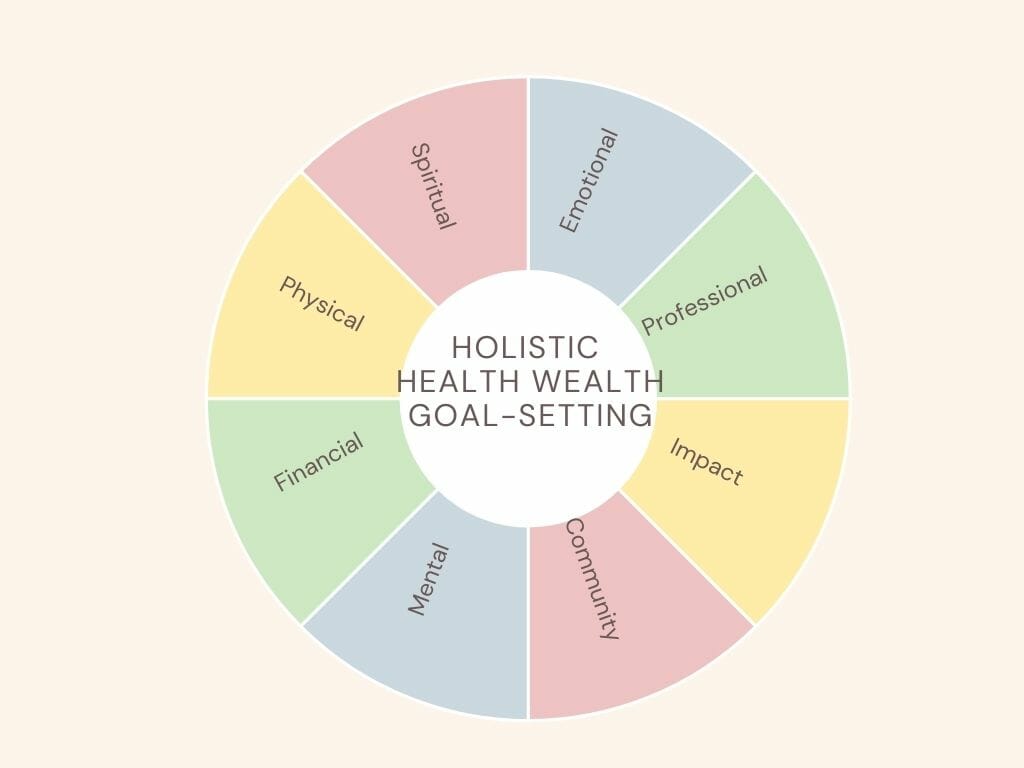8 Areas for Goal Setting to Build a Holistic Wealthy Life

Goal setting is an important ingredient for living a productive and meaningful life. But, it can be overwhelming to determine what the right goals are to set. It can also be challenging to know when is the right time to set specific goals.
Here at Well and Wealthy, we like to present a holistic approach to wealth in an attempt to simplify the goal setting process.
The best way is to set no more than three smaller goals at one time to stay focused and to maximize the likelihood that you will achieve your life and career goals around wealth.
By looking across 8 areas of wealth, you can determine what areas of life and wealth you want to focus on and then decide what specific goal in that area to set.
As an affiliate partner of various brands and sponsored content, we may earn commission on qualifying purchases. Disclaimer | Advertise With Us
Before we get to the process of goal-setting, let’s look at each area of your life and the 8 areas of wealth.

Physical health wealth
“Take care of yourself. It is the only place you have to live.”
–Source: India.com
Indeed, it is important to take care of the body that houses our soul. Physical health in many cases increases in importance with age and is easy to take for granted.
Take a person who has a brain hemorrhage at age 45 who walked three miles a day and did martial arts four times a week but had not been to the doctor in a few years. This person was an average weight but had not realized that he had become pre-diabetic, even though his eating habits were relatively healthy.
One day on a random Saturday after a long walk with a friend and a personal challenge to remain in a plank for 2 minutes, he finds himself getting dizzy one minute and realizes his leg stops working the next.
In the span of 5 minutes, he goes from living on his own with all of his cognitive faculties and without any physical disabilities to unable to speak and move his limbs when he wants them to work.
He loses the ability to move his right leg and right arm and now, finds himself doing therapy to retrain his brain and leg to work together to walk again.
Now this is a somewhat extreme example, but it is a true story. Physical health indeed is a major area of wealth and one where many different types of goals can be employed.
Spiritual health wealth
“There is a spiritual connection to good health. It is not just physical.”
–Nancy Evans
Those with robust spiritual health wealth usually have good standards in other areas of health. A key part is that they can clearly articulate their life’s meaning and purpose.
They act in alignment with their values and have compassion for others, animals, and the environment. They strive to do their best and operate with high standards, but practice self-acceptance and forgiveness when they fall short.
They have a sense of peace and balance among the physical, emotional, social and spiritual aspects of their lives.
Clarity of spiritual health wealth oftentimes occurs when a painful experience has transpired. For example, someone who has experienced the death of a parent is the type of situation that can spur spiritual growth.
With a death, this person comes to realize that life is fragile and can end at any time. It is natural to learn that there is very little in life that can be controlled. The only thing that any one of us can control is our response to life situations.
With this growth, there is a relaxation of perspectives on the situations that previously caused a lot of stress. To demonstrate, let’s say Marguerite was responsible for a critical project at work that is forecasted to generate hundreds of millions of revenue for her employer.
Before the death of her mom, she frequently experienced the weight of the project because the success of this project determined whether or not the company earned millions of dollars.
She felt solely responsible for the success of this project and sacrificed dozens of hours of time that could have been spent with family. As a result, the stress caused erratic sleep patterns.
When she did come home, the tension she brought home was palpable. She delayed seeing her mom over and over because it was never a good time at work. She always took for granted that her mom would be there.
After her mom’s death, she felt guilty. She questioned why she allowed work to be used as an excuse to delay visiting her mom.
Here is the thing…the weight of the stress that she felt for that project at work is nothing compared to the weight of the grief she has experienced after her mom’s death. She would give anything to be able to spend one more day with her.
Through her grief, she began asking existential questions. Why was mom’s life cut short? What is she doing with hers? What is the point of all the striving and living a life full of stress? What is she striving for? The best house? The best car? The best schools and activities for her children?
This death throws Marguerite into constant questioning…she no longer knows what her purpose is….She no longer knows what she is working so hard for?
So she begins searching…searching for what, she is not sure.
She wants to get to know herself better. So she tries different things…new types of exercise. She starts therapy. She explores new interests with each of her kids, such as flying a kite, long distance running, and volunteering with her child at a women’s shelter.
Through these activities, she notices she laughs a lot, experiences joy and recognizes that her previous life did not contain much fun and laughter.
With this new understanding, she vows to live differently. She makes a promise to take care of herself physically and mentally.
She discovers her likes and dislikes and realizes how much heaviness her previous life contained. With her new curiosity of discovering who she is, Marguerite delves into spirituality and tries different ways to connect with Spirit. She tries going to church, doing yoga, meditation, joining a faith community choir and joining a study group of Sacred text.
She settles in on a faith community, joining its choir and long-distance running because she can do it with her children as her primary consistent activities for her spiritual wellbeing.
After many months, she realizes how unhappy she had been previously. She no longer ties her self image to the success at her job. Yes, her job is important. It is part of who she is, but it is not all she is.
Through the pain of dealing with her mom’s death, she finds the gift of her own happiness and connection with her soul and Higher Power. This journey in all of exploration and its twists and turns of searching is spiritual health wealth. Many times, our search for spiritual growth starts with activities in the physical and mental health areas.
Your journey does not need to include intense pain or death. It can start with the realization of unhappiness or just a constant “meh” feeling that you want to get rid of in the long run .The journey is a great way to explore spiritual goals.

Mental health wealth
“Mental health is not a destination, but a process. It is about how you drive, not where you are going.”
–Source: healthyplace.com
Having wealth mentally is about how you do things and means that your brain functions well in the face of adversity. This medical professional describes mental health as the “hardware” and “emotional health as the software.” Therefore, mental health is about the functioning of the brain because it is the central processing unit of the body.
Having mental health wealth enables you to be productive in life, set goals and achieve them, adapt to change and maintain healthy connections with others.
In high stakes situations, you are unattached to the outcomes. Yes, you have preference for one outcome over another, but if the outcome that you least prefer occurs, you are okay. No matter what the outcome, you know deep down that the effort you put in was the same. You are invested in the journey more than the outcome itself.
Mental health wealth also means being self aware of how your body reacts to potentially stressful environments as you encounter them, not after you do. You are able to make a conscious choice to de stress beforehand.
To demonstrate, let’s say you are meeting your partner’s parents, who are very different than you and your family. But, you love your partner and you really want to impress your partner’s family. You know that your partner’s parents are not a big fan of you. It is a tense situation.
However, honoring family traditions is important to your partner. You continue to participate in these tense family gatherings as a result.
Your mental health is not compromised in this stressful situation because you know it is temporary. As a result, you are resilient mentally.
Emotional health wealth
“The primary cause of unhappiness is never the situation, but your thoughts about it.”
–Source: Iamfearlesssourl.com
Having wealth emotionally is having increased awareness about the feelings in response to situations you encounter. While closely tied to mental health, emotional wellbeing is being aware of your feelings, having the ability to process, manage and accept them in the moment, and then, expressing them.
Emotional health wealth combines emotional intelligence with emotional regulation. To maintain a healthy emotional state, you have a solid understanding of how your thoughts influence your feelings and then your outward behaviors.
Using the example above, emotional health wealth means that you understand that this upcoming family gathering is stressful. You know that it triggers all of your insecurities because you really want to be liked by your partner’s parents.
You also know that you have done everything in your power to make sure they like you. You have demonstrated your love for your partner. You have cooked them meals and been thoughtful in gift-giving. You have offered assistance to help prepare and clean up after family gatherings. Their dislike for you is on them and has nothing to do with you.
Knowing this and practicing it, however, are two different things. To remain grounded at family gathering, you know that you have to mentally prepare for the stressful time at the family gathering. As a result, you make sure you exercise beforehand and you journal. You also communicate with your partner that you will need to take frequent time-outs by yourself at the family gathering to check in with yourself and care for your mental state.
You remind yourself to breathe through the small acts of hostility and passive aggressive behavior.you encounter You tell yourself you can move through the hours-long day with ease.
You have the emotional intelligence to be aware of your feelings and the ability to regulate your emotional response to the stressful situation. After the event, you know you will need to release the negativity because not addressing it will cause more harm. This is emotional health wealth.
The journey to attain emotional health wealthcan take months and years. It is a great area to set goals because there is always growth to pursue as options.
To demonstrate, sitting for two minutes a day to observe your thoughts and write down what comes to you is a worthwhile, easy-to-achieve goal to start.

Financial health wealth
“Physical and financial health are both important. If you don’t have physical health, you cannot do much. If you don’t have financial health, you cannot do much either.”
–Tom Basso
You can have a lot of money but not be financially healthy. For example, if you make a lot of money but don’t save any and buy stuff to compensate for low self esteem, your finances are not healthy.
Financial health wealth means that you have the building blocks for financial security and/or you are employing good habits around achieving financial goals. For example,
You have 3-6 months worth of your expenses saved. Basic living expenses include the cost of housing, including utilities and internet, food and transportation. Having 3 months saved up at a minimum means that you can experience a serious financial setback without concern for where the money will come from to pay for it.
It does not guarantee that the situation won’t cause stress, but that you have the money set aside to pay for the expense without having to use credit cards.
Another aspect of good financial health is saving for the future. A lot of times, there are competing goals with different time horizons, such as saving for retirement, buying a house, and/or paying for presents during the holidays, etc. It can be overwhelming to tackle multiple savings priorities.
The first step in saving for retirement is to enroll in your employer’s 401k plan and invest up to the employer match, if they offer one. You can read more here to explain what a 401k plan is.
If your employer does not offer a 401k or you are self employed, you can open a Roth IRA and contribute $6,000 per year.
Then, you can allocate money to the next financial priority, which you would like to achieve in the next 3-5 years. An example of this is saving for down payment on a house or saving to purchase a car with cash.
Finally, most don’t even save for short term spending, such as holiday gift giving or going on a vacation. But, these are big ticket spending items that can cause stress if there is no money set aside for it in advance or no thought into how these expenditures will be paid for.
To achieve short term commitments, it is important to determine how much you plan to spend. The easiest way is to determine a number and then divide it by how many months you have until the deadline. For example, if you start saving for December holiday gifts in June and you have a budget of $1,200, then, it is best to save $200 per month.
If you want to save for a car, your research indicates that it will cost $15,000, and you plan to buy it in 3 years, then divide $15,000 by 36 months (12 months per year at 3 years). You need to save $416 per month to achieve this goal.
Having emergency savings of three months worth of your monthly housing, food and transportation expenses, investing for retirement and saving for major annual expenses and those in three to five years are the building blocks of financial health wealth.
Community wealth
“Individually, we are one drop. Together, we are an ocean.”
–Source: beautyconservator.com
The truth is we need people. We need community. We are social beings. Honoring it through this type of wealth involves the significance and quality of your friends and family. You can find community among the people in your preferred house of worship, in online groups, among your best friends in your neighborhood and/or among your family members. Measuring community wealth can be done in two types of ways.
- When experiencing a difficult life situation, analyzing your level of comfort in confiding in your close friends and how many people you can go to to gain support.
- When wanting to make a change in a major life situation, such as a career move, moving to a new city or state, or romantic relationship change, how supportive do you feel those closest to you will be? How much will they encourage you to make a change? How much do you really feel they want what is best for you?
This is the definition of community wealth and one that involves relationship goals.
Setting clear goals in this area is about deepening relationships with those around you or searching for new relationships to identify an unfulfilled need.
For example, loneliness has increased with the rise in social media and smart phones. It is not uncommon for individuals to have people around them and feel lonely. A college student heading off to university without knowing many people can feel lonely while being surrounded by dozens of people. A good goal for this college student is to attend 4 gatherings of people who have the same interests in the next week to “find their people.”

Impact wealth
“I have found that among its other benefits, giving liberates the soul of the giver.”
–Maya Angeliou
Making an impact usually is a big motivator for most people, and this is what is meant by impact wealth. How much do you feel you are impacting something that is bigger than yourself is one of the best ways to describe impact wealth.
This area of life is one where much personal growth occurs to become a better person and is likely to be an area where small lifetime goals each month or year make a big impact over the course of a lifetime.
The “something bigger” can be one person, one animal or one tree. It could be 100 people or 1,000 bodies of water. It could be an issue that you care about, a cause that is close to your heart. It could be your children.
You get to define what impact means to you. There is no one or only way to achieve this. For one person, making an impact could be donating money to one organization or cause that is close to their heart. For another, it could be volunteering 100 hours for children with disabilities. For another, it could be consistently purchasing groceries for a local family in need or taking in a child in foster care.
The important part is doing or giving something beyond yourself.
Professional relationship wealth
“You are the average of the five people you spend the most time with.”
–Jim Rohn
The quote describes professional wealth perfectly. The individuals that you surround yourself (online and offline) with can totally change your life, whether you are an employee aspiring to advance to CEO one day or you are a current entrepreneur trying to build an empire or grow your company.
Professional wealth is the epitome of the old adage, “It is not what you know but who you know.” Getting around the right people is known to be one of the biggest success hacks because when you put yourself in the room with people who are smarter, more successful, and comfortable with taking bigger risks than you, your horizons of what is possible are bigger. In many cases, you think bigger and dream bigger.
And, you might be thinking, well, “I don’t really care about professional wealth. Material success is not that important to me.” And that is perfectly fine.
The beauty about all of these areas of wealth is that they vary in importance from person to person.
Setting a professional goal in this area is all about the building relationships with people to enable success. You can have other education or professional goals.

Steps to set goals to create your holistic health wealth
The first step in goal-setting is to analyze your level of satisfaction of each area (spiritual health wealth, financial health wealth, impact wealth, etc) on a scale of 1 to 10 (1-Not at all satisfied; 10 Very satisfied).
Next, select 3 areas that you want to work on. There are a few ways to do this. One way is to look at those areas where you are least satisfied and consider choosing these areas in which to set your goals. Another way is to look at what areas you are most satisfied with and continue to work on it. Or some combination of both.
Then, identify one goal for each area that would increase your level of satisfaction for this area. Now there is a whole system for the best types of goals called SMART goals.
To demonstrate, let’s return to Marguerite and her situation. Evaluating each area after her mom’s death, she realized the three areas she had the least satisfaction were spiritual health wealth, mental health wealth, and impact wealth. So to improve in each area, she set a small achievable daily goal:
- Spiritual health wealth: Read 10 minutes each day a sacred text from the world’s religions to see what appeals to her for 30 days.
- Mental health wealth: Journaling to outline 5 things she is grateful every day and why.for 30 days.
- Impact wealth: Since she realizes that she has not been the most present parent, Marguerite’s goal in this area is to sit down each of her two children to hear about their day for 30 days.
Starting small is the best way to proceed if you are doing this the first time.
Let’s take a look at how Marguerite might set goals for a second round in these same areas. In area, she might continue the same practice or choose another one:
- Spiritual health wealth: Through the last 30 days, she figures out that she needs more than just reading to explore spirituality, so she decides that she is going to try a yoga practice.
- Mental health wealth: She will continue with gratitude journaling.
- Impact wealth: Marguerite has enjoyed the daily habit of spending time with each one of her children and now she wants to add to it by exploring an activity with them. She sets a goal to have a date with each kid once per week. She decides to bowl with one child one week and volunteer with her other child the next week.
Conclusion
It can seem daunting to start this process. This is the reason to choose with areas and select a small goal for a short defined time frame. Over time, as you figure out what you like and don’t like, clarity emerges and improves. In addition, progress and success multiplies by starting and consistently exploring your holistic health wealth.









